© 2026 Ararat Challenge
Privacy Policy
Mobile People, Mobile Bees and Mobile Theater
19.07.2021
Text by Ani Minasyan
Photos by Areg Balayan
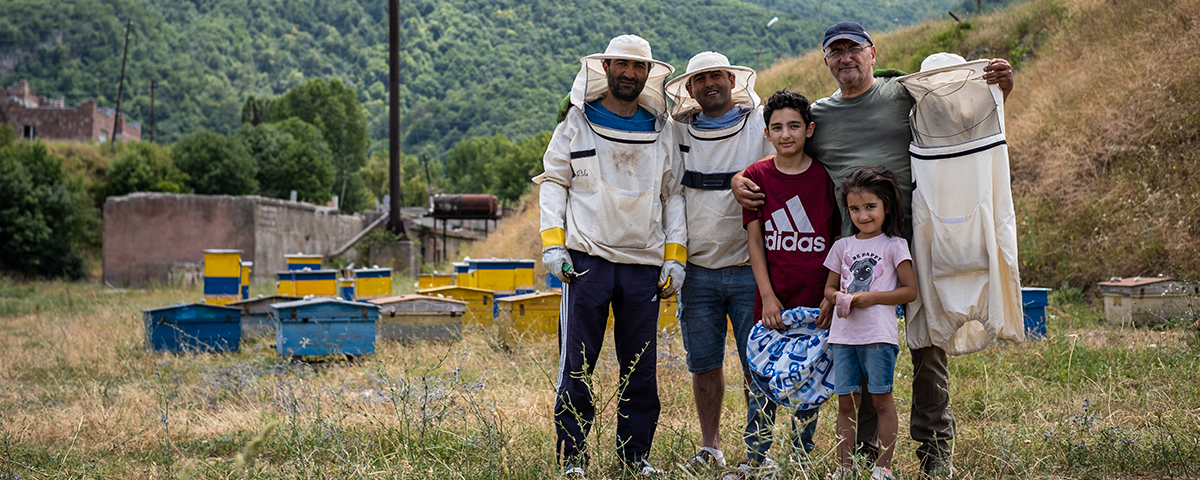
After the Armenian-Azerbaijani war in 2020, thousands of people were left homeless. Some have lost everything.
Among these thousands are former staff of the Shushi branch of the “Naregatsi” Art Institute.
Shushi, “Naregatsi”, art, institute, home, work – for them all these concepts are in the past now. Only their group and the fact that they are together remained. What is the future? Work. And togetherness.
People who are searching, but cannot find
After wandering for several months, part of the Shushi staff of “Naregatsi” reached the Getahovit village in the region of Tavush. There they rented the second floor of a two-storey building. They don’t use the garden, the first floor and the small playground.
“You will never be able to repeat what happened. It was always different. Interestingly, there, in Shushi, the building was not ours, but we have treated it as our property. However, here everything is different, not a single house touches our hearts,” – says Hayk Papyan, the former director of the Shushi branch of the “Naregatsi” Art Institute.
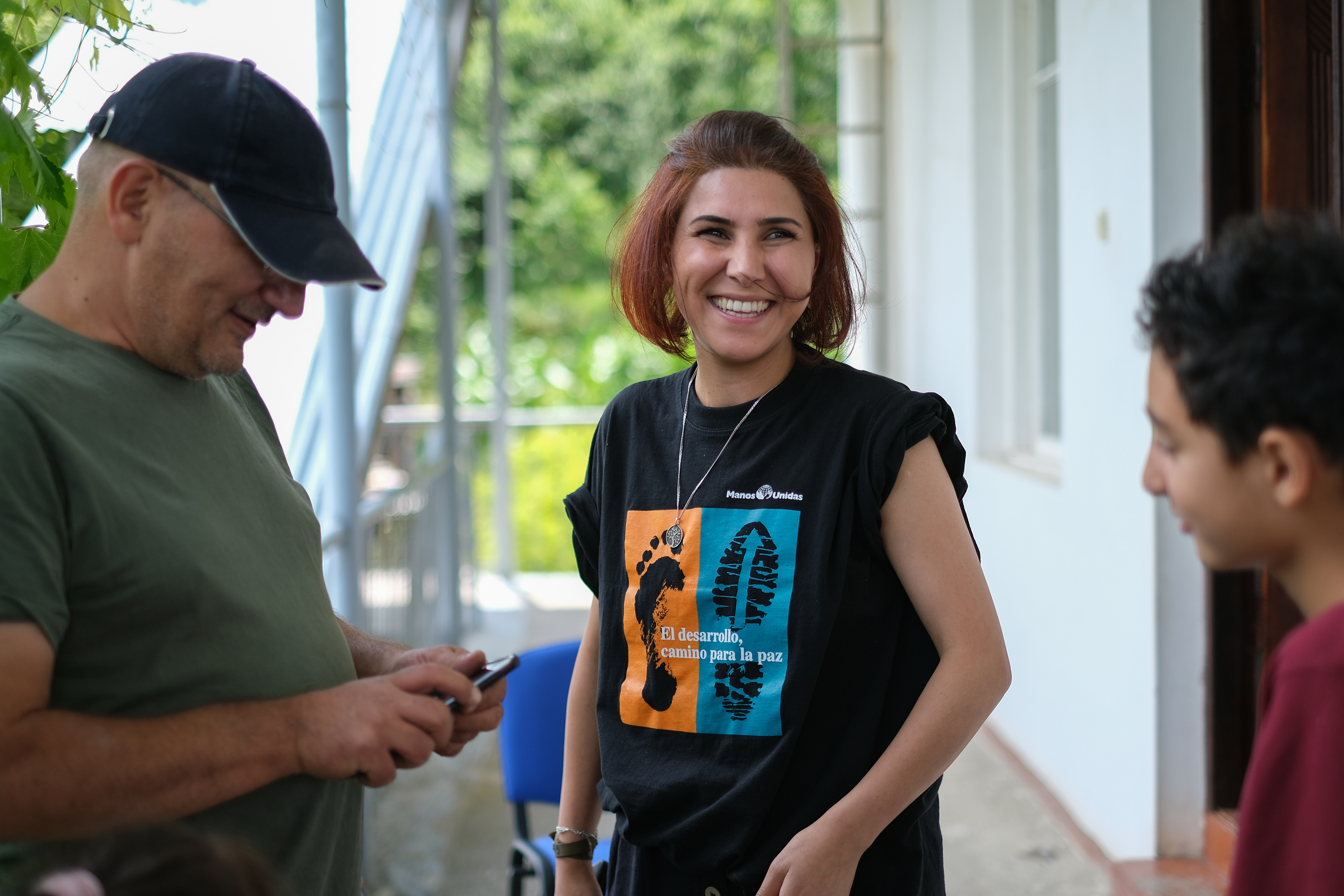
Hayk Papyan, Gayane Arushanyan and Grigor on the balcony of their house in Getahovit
"Naregatsi" arrived in Getahovit, but not with its full staff.
One of the newcomers, Nver Karabekyan, stayed at home with his two children, Grigor and Arpi, because his wife was at work. He also says that none of the places they could visit touches him as deeply as in Shushi, but Getahovit somehow attracted him.
“The nature. Upon arrival, we went around several villages, but when we came to this one, it was like a breath of fresh air. We got the ‘message’ straight away: we are in the right place.”
 Arpi and Nver
Arpi and Nver
This is not to say that they have completely adapted in the “right place”. The nature is good, but the house does not suit them. At the end of July, they will probably give it back to the landlord… and move away.
“Again?” – I ask.
“Again, but this time we’ll move to a place, where the bees will be busy,” – they reply.
Bees are the new meaning of life, the new occupation of Shushi's "Naregatsi".
The bees that roam all the time to find
“We have to do what the bees want, otherwise we might kill them. Our place of residence depends on their work,” – Nver and Hayk say, trying to decide where the bees will be better off in Armenia. They have to be moved.
Within the framework of “Aurora for Artsakh” program, Hayk, Nver, Artak and Armen received fifty hives with bees. And started a new business.
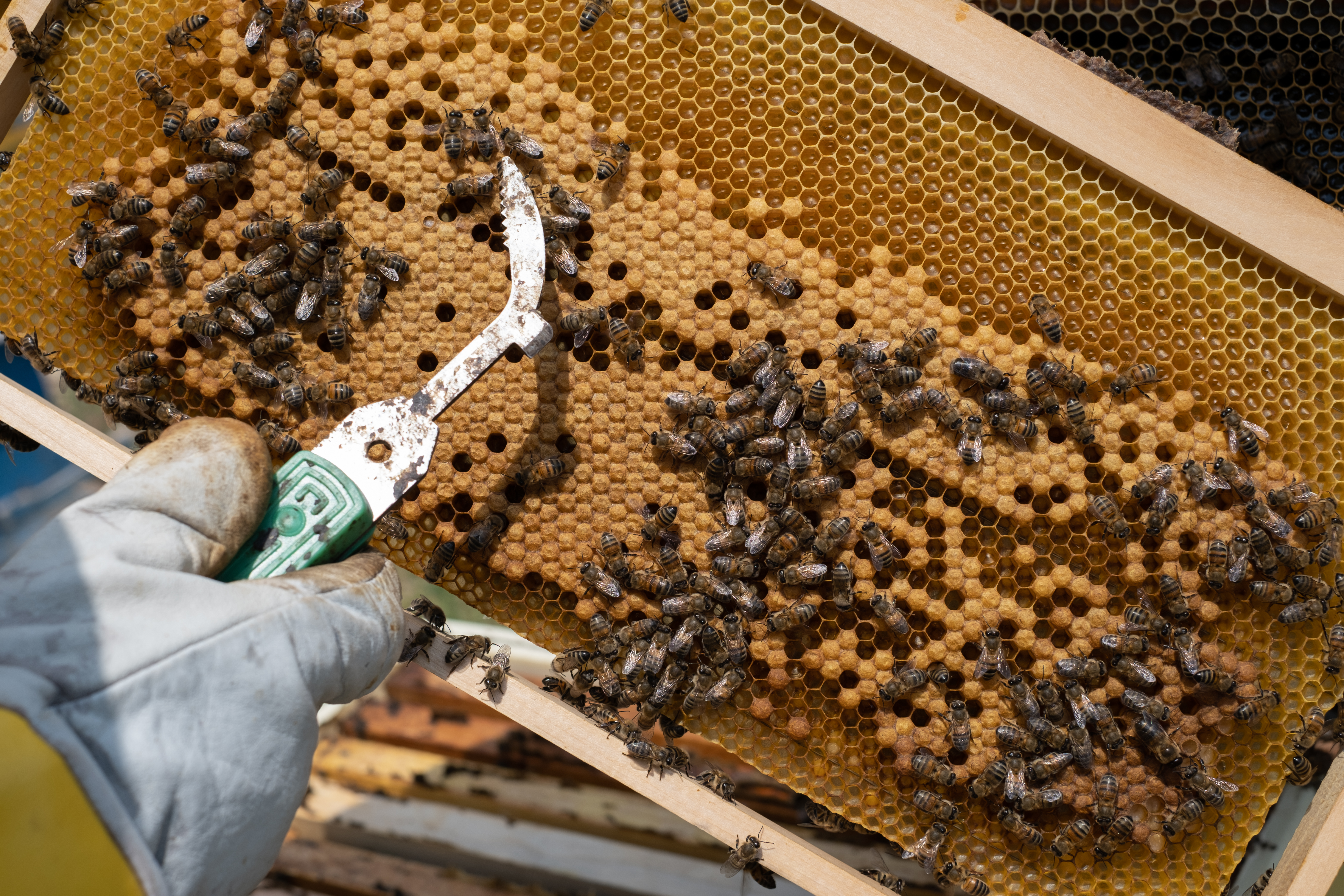 Armen shows the honeycomb where the queen bee had laid eggs
Armen shows the honeycomb where the queen bee had laid eggs
“I first put on my beekeeper's clothes two weeks ago. Nver a little earlier. Armen has over ten years of experience, while Artak has several years. To be honest, I struggle with them.” – Hayk speaks about his new occupation. So, we, together with Nver, the children and Hayk, drive up to the bees. And to Armen. Today is his turn to take care of the bees.
The bees live in a place where in Soviet times was a rest house, then a military unit, and now this place is a private property.
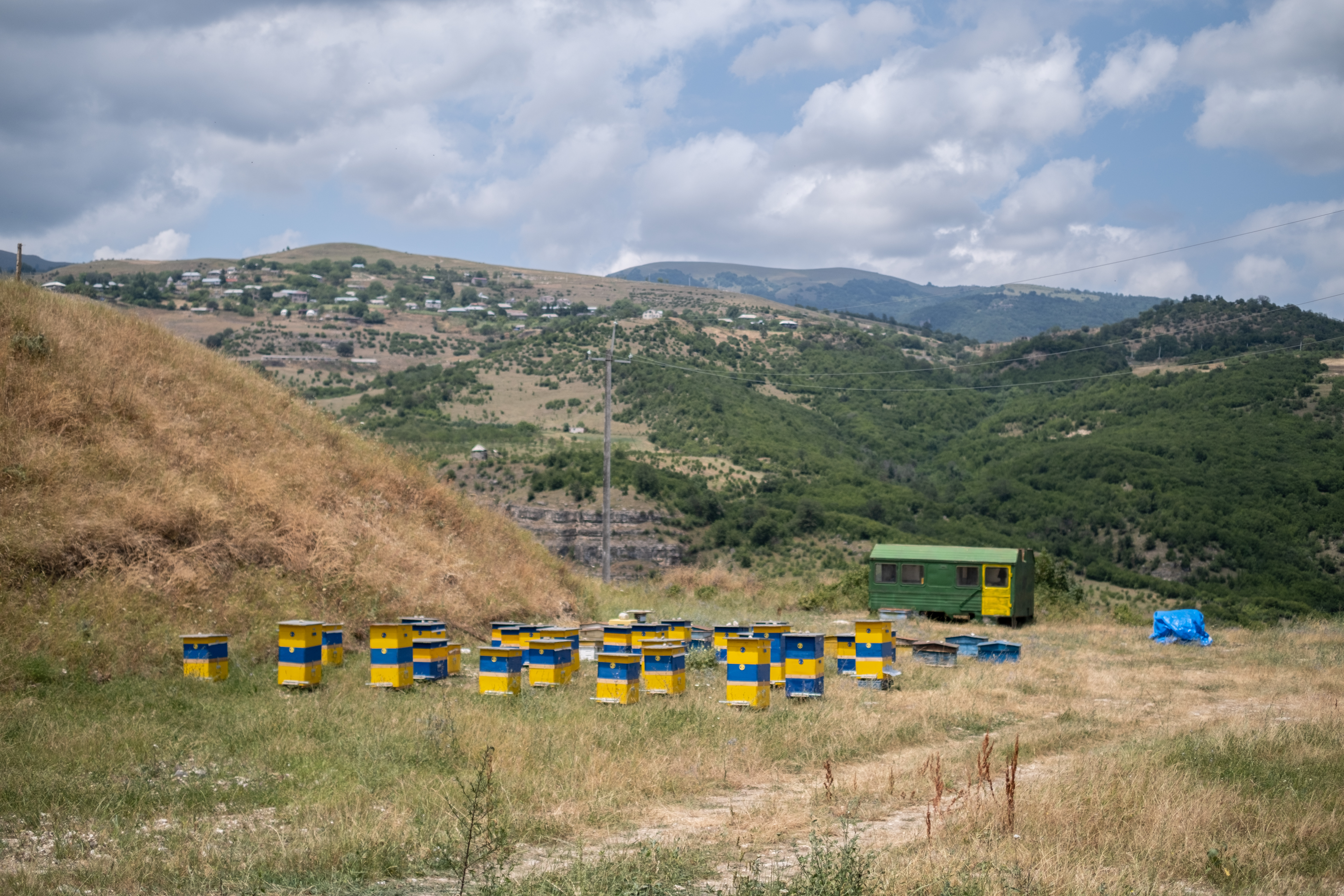
Stones are placed on top of the hives to show how many frames should be replaced
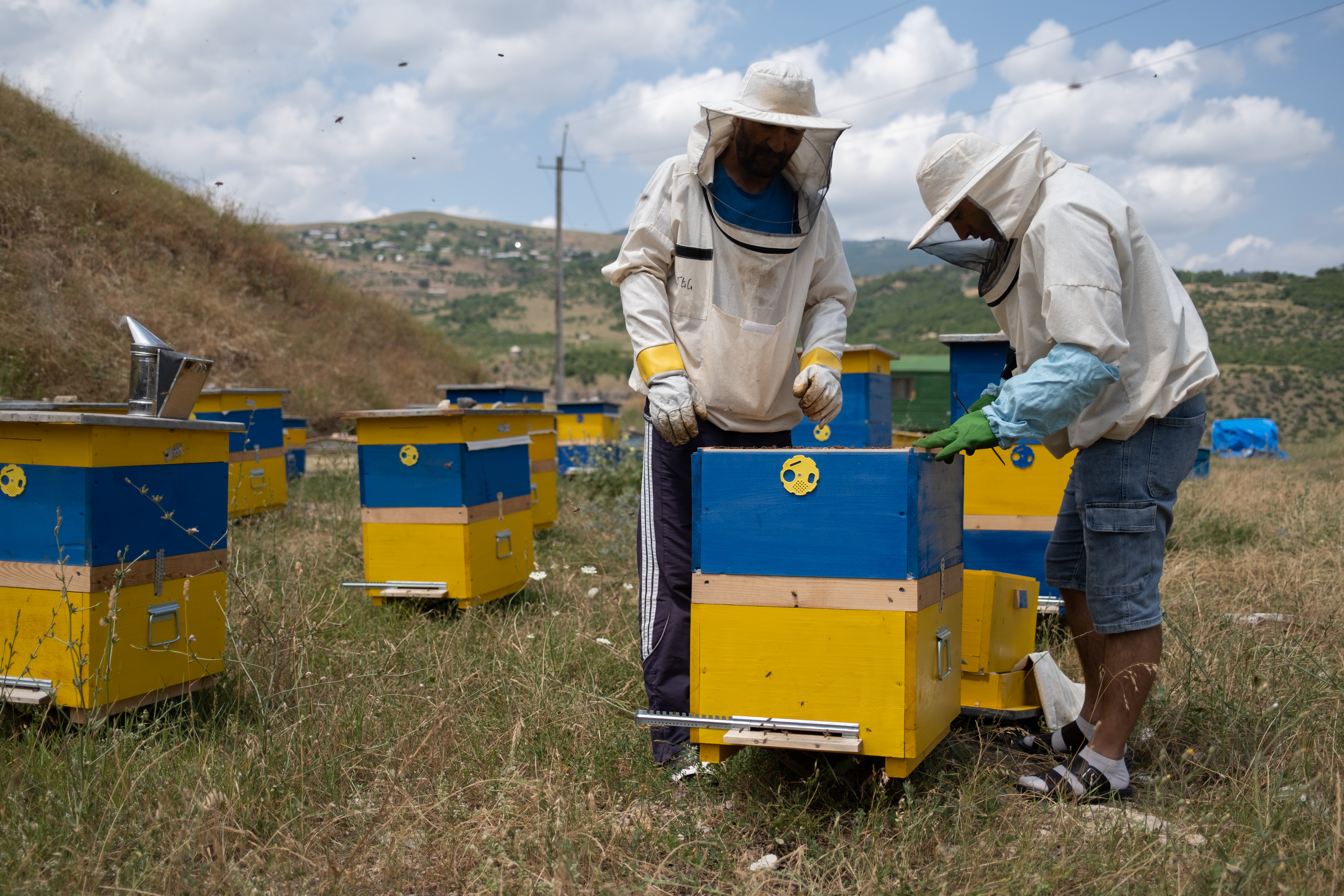 The hives should be opened with extreme care and that takes a lot of skill
The hives should be opened with extreme care and that takes a lot of skill
“We are not unhappy, but we believe nothing special is happening in this place.”
A dilapidated road leads to the bees. The car swings left and right, and that is fun for the children. We got to the place in a few minutes.
 Arpi and Grigor take turns driving: one drives up all the way to the bees, and the other – on the way back.
Arpi and Grigor take turns driving: one drives up all the way to the bees, and the other – on the way back.
Armen Asiryan is the most experienced of all beekeepers. To approach the worker bees, the three of us – Armen, Nver and me – pull on protective clothes. Names of the owners are written on the thick cotton fabric. I put on the clothes of Artak, who was not in Getahovit that day.
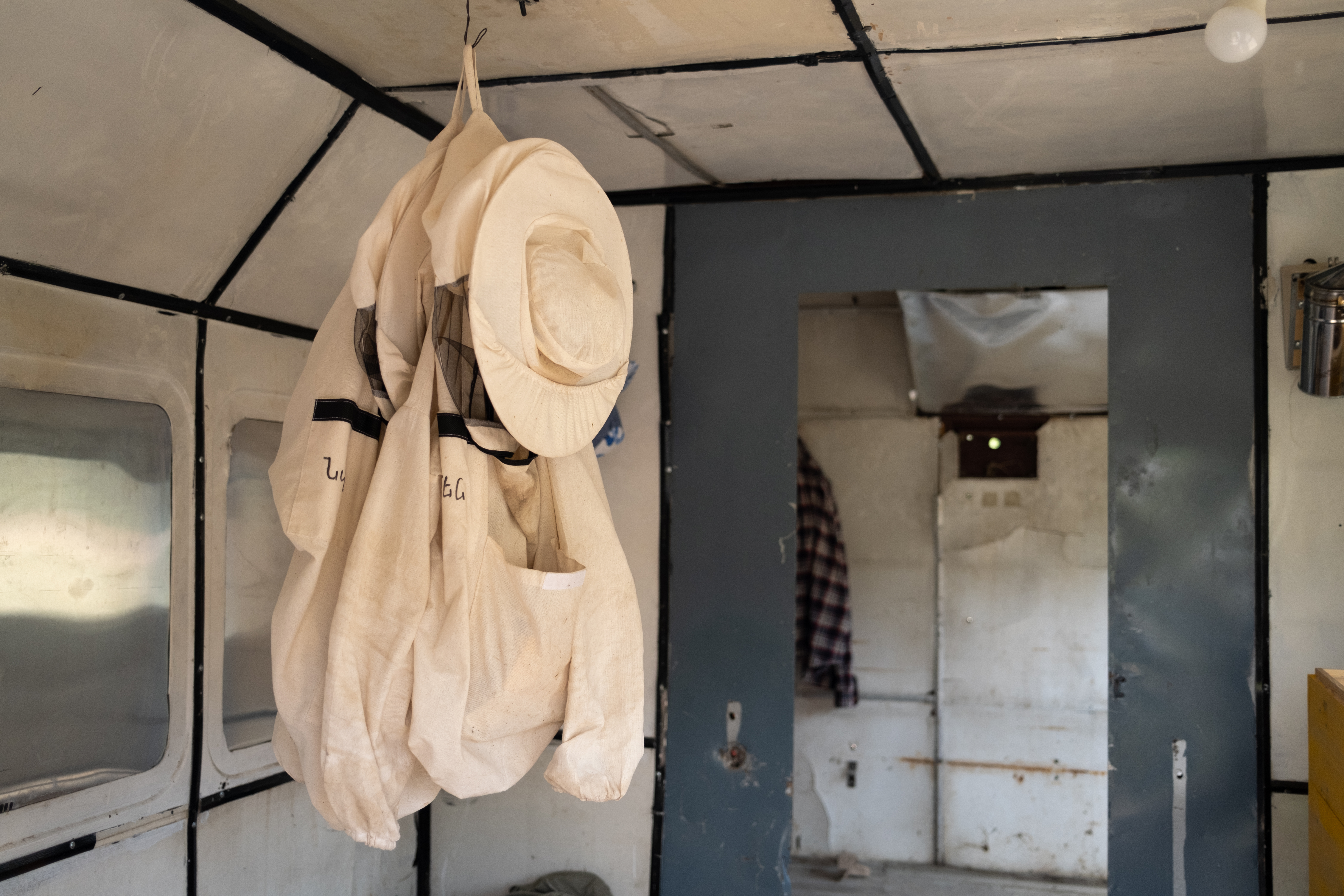 The names of the owners are written on the costumes of the beekeepers
The names of the owners are written on the costumes of the beekeepers
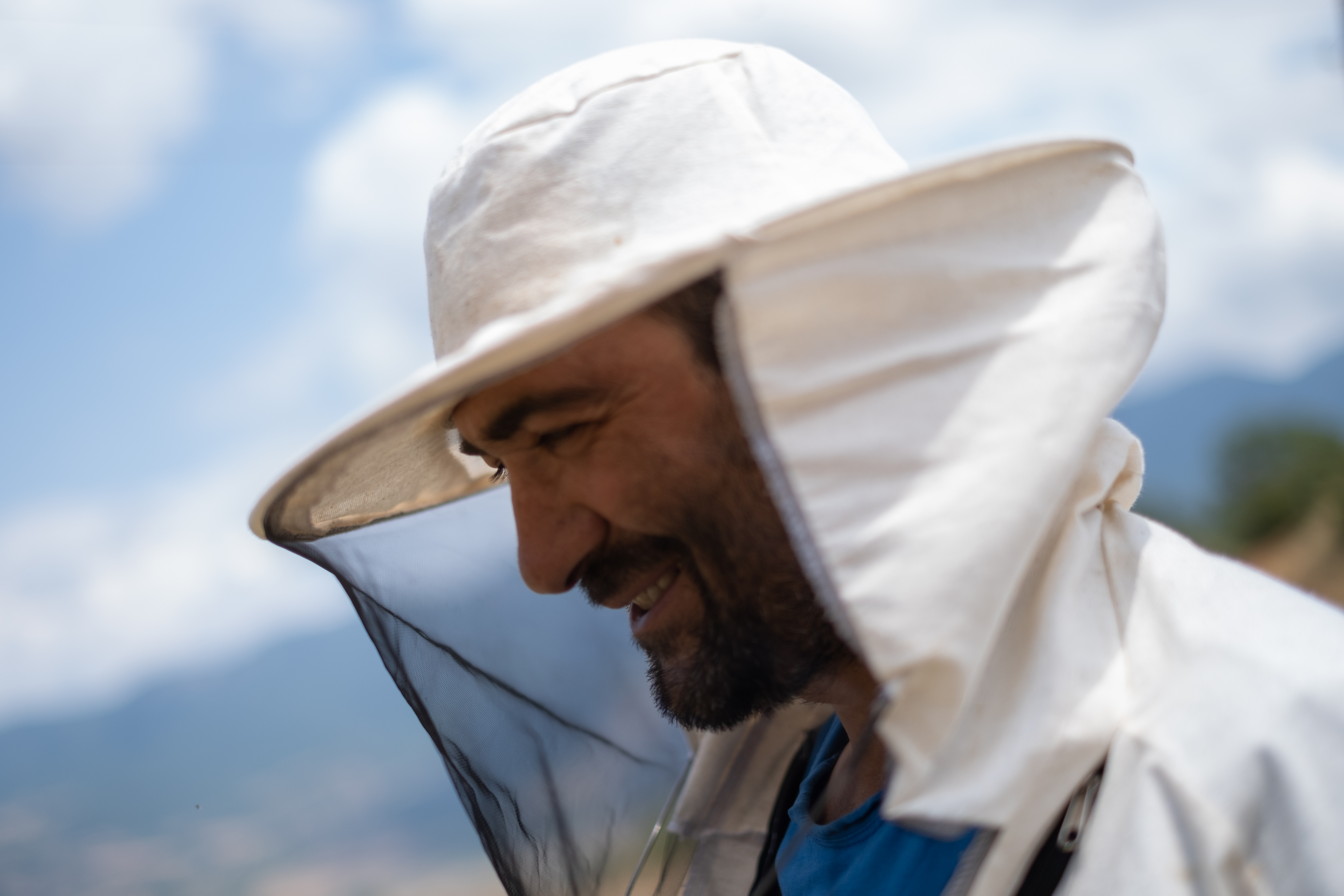
Armen Asiryan starts working
We “disturb” the bees with smoke.
They become active.
“They start from the bottom row and move up to the top floor. If the weather is good and the harvest is good, they will stay in the top row,” – says Armen and opens one of the hives. They are two or three stories high; below the bees reproduce, and above they work.
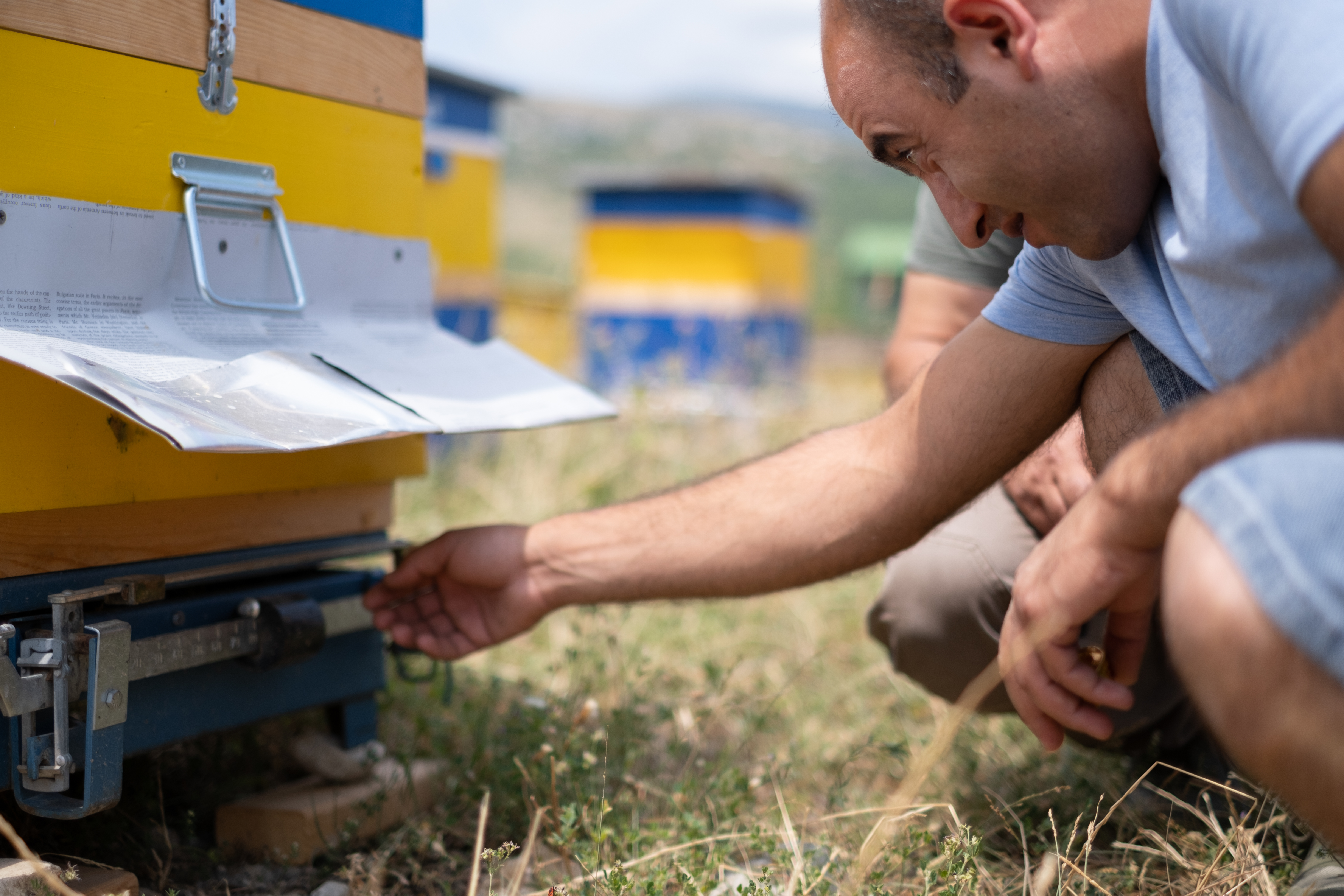 Nver weighs the hive to see how much nectar was collected
Nver weighs the hive to see how much nectar was collected
Bees do not sleep at night, always moving their wings like fans. The guys explain that ever bee has their own job. They belong to a system. I ask, whether the bees are of the same nationality?
“We don't know,” – Nver and Armen say, – “but they live by very strict laws”.
The gathering of bees in the Getahovit area is not very good, so in a few days they will be moved, but no-one knows, where. Most importantly, everyone in the “Naregatsi” group should stick together. People have learned this from bees.
A drop of honey and the mobile theatre of the future
“Now we are driving up the mountains, then we will go to have a look at our land, and you will immediately understand how we chose this piece of land,” – so, we climb several hundred meters from the bees. There is a piece of land bought by Hayk, Nver and Artak. This is “Apaga” which in Armenian means “Future”.
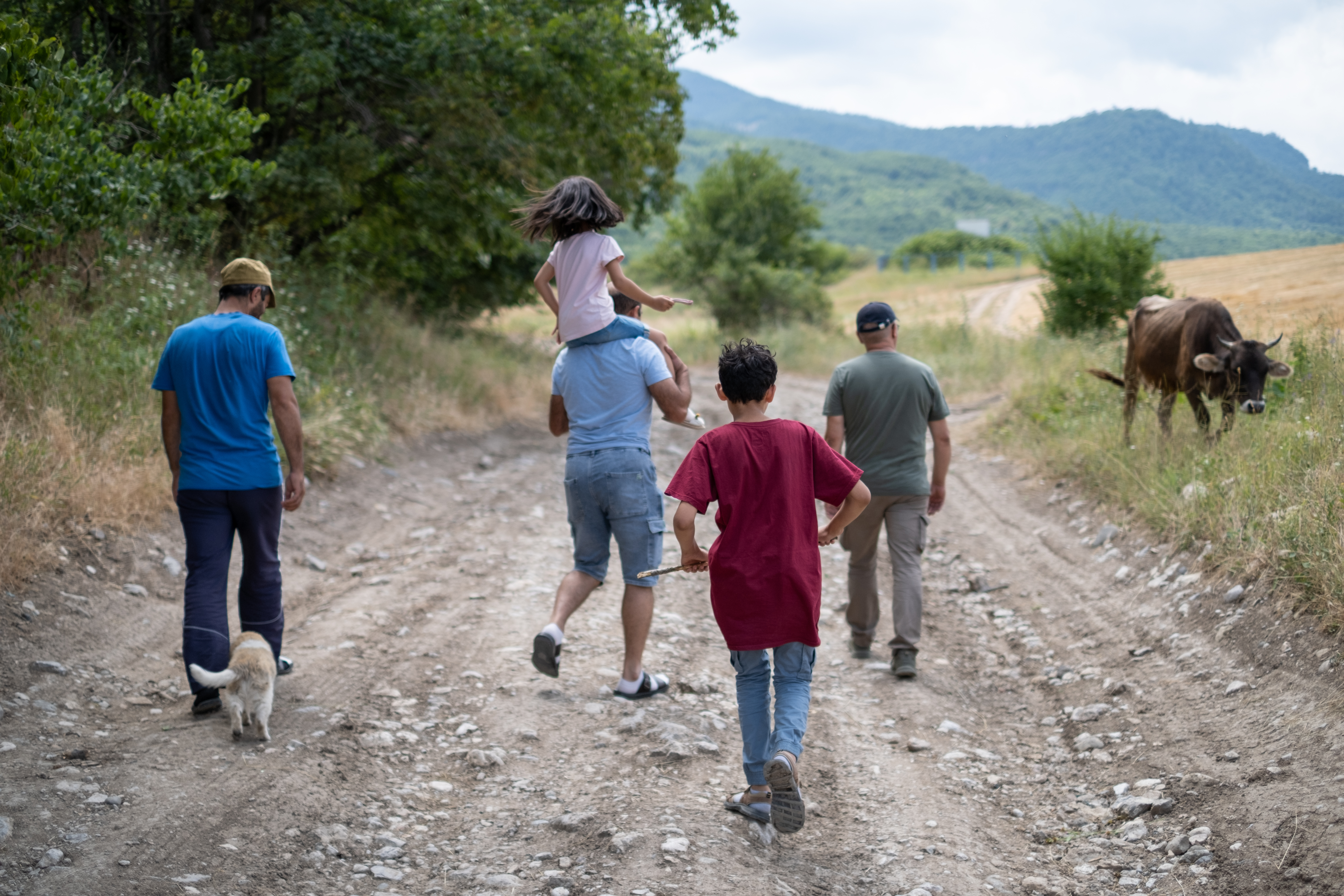 All together – towards the "Future"
All together – towards the "Future"
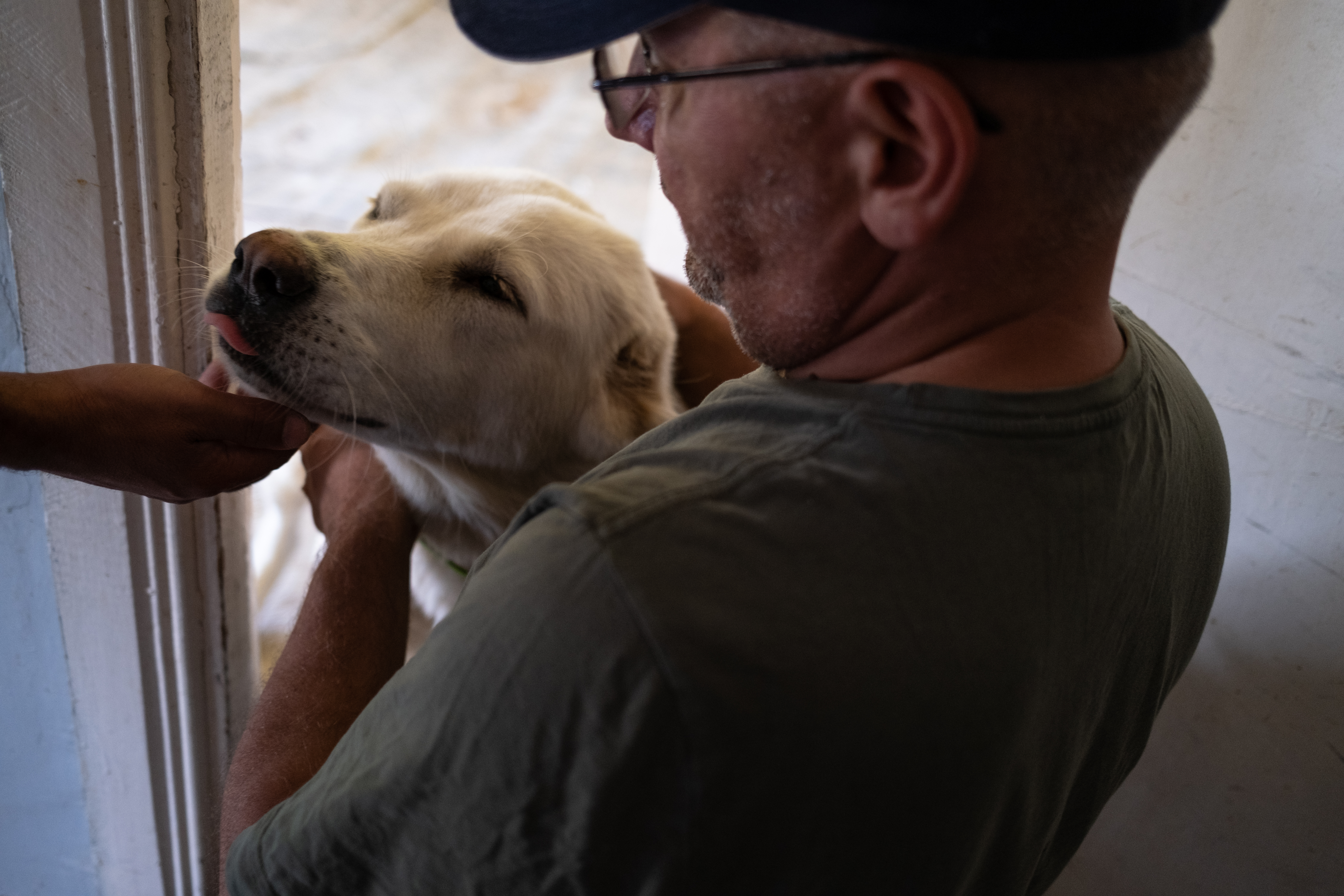 Hayk visited his dog on the way up. The dog recently gave birth
Hayk visited his dog on the way up. The dog recently gave birth
None of the houses in the village touched their hearts, they felt there is something wrong in each of them. And so, they decided to build a house with their own hands, to make an art village.
All the way up they told us that the area is very similar to Jdrduz in Shushi. We drove, remembering the past, to see a space of the future. But not to forget what happened.
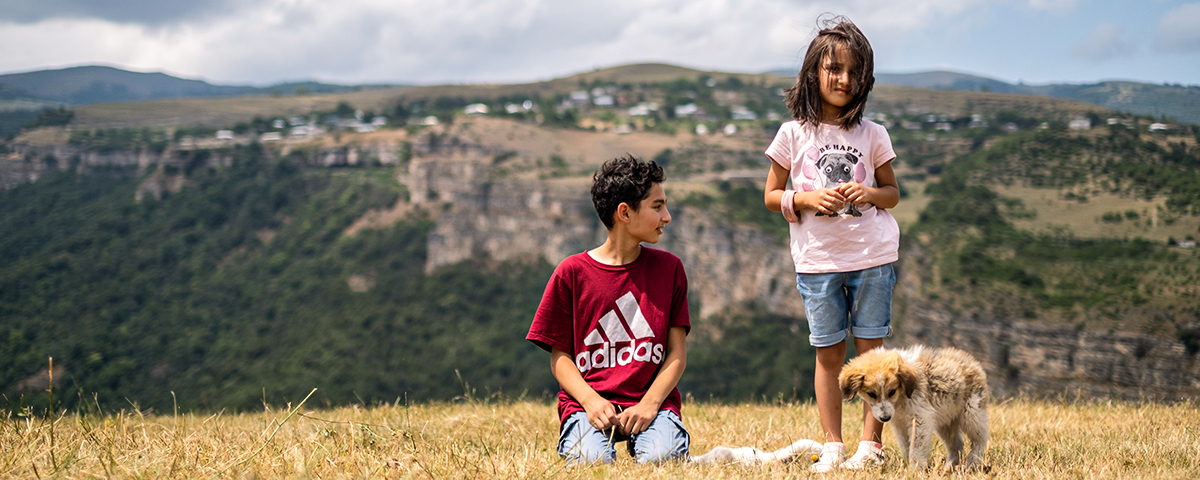 Children are free here
Children are free here
“Look, this is a flat place, and then the gorge descends and there are these white rocks on the opposite slope. I think, it looks pretty much like Jdrduz,” – says Nver.
Indeed. A flat piece of land of about 5000 square meters, behind which there is a deep gorge, and cliff on the opposite slope. But one can find such places almost everywhere in Armenia.
And Hayk keeps repeating: “We got here, having deceived ourselves, convinced that we had found a place similar to Shushi. But you can never repeat what happened once. It will not work. Never”.
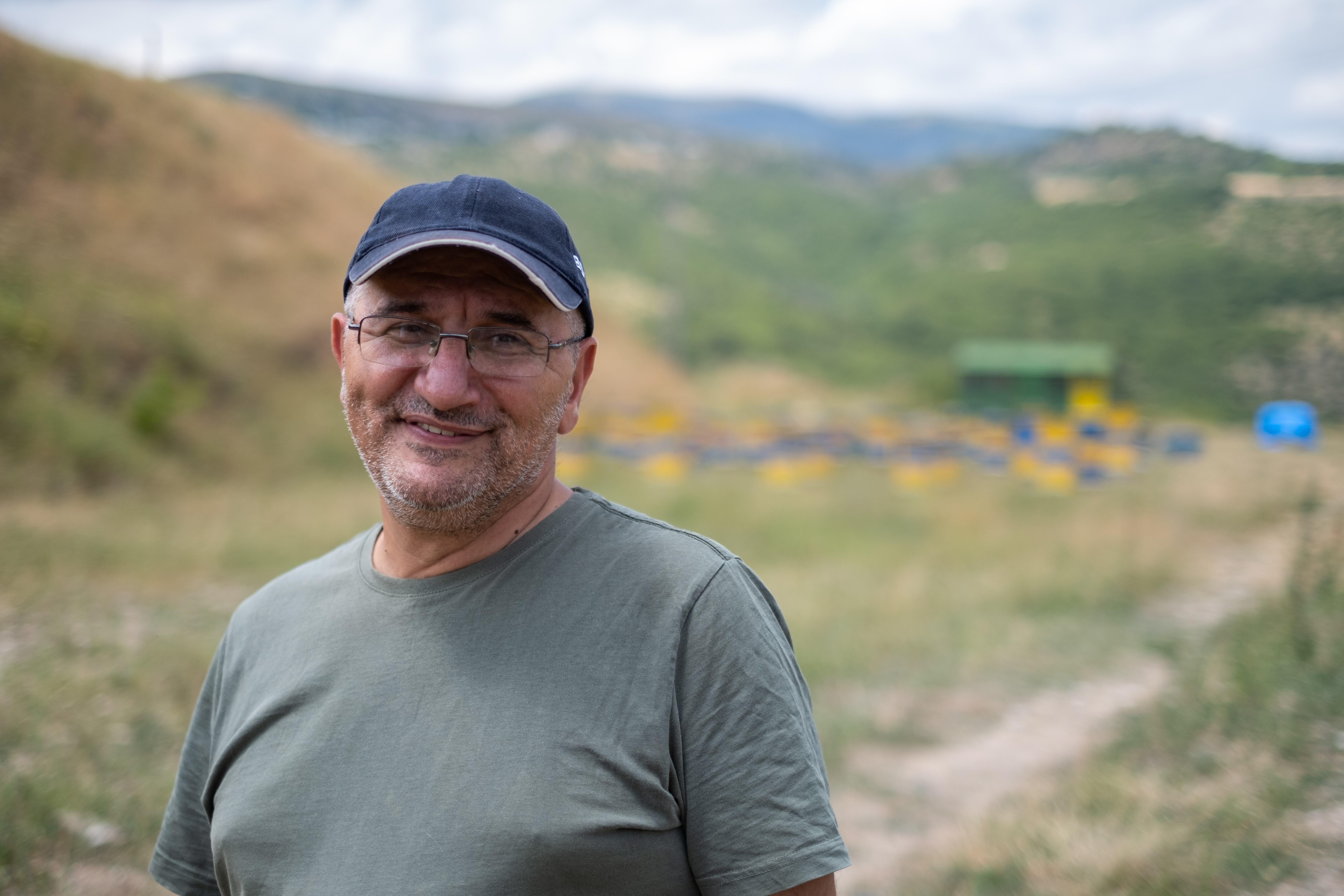 Shushi’s “Naregatsi” staff trusts Hayk and follows his advice
Shushi’s “Naregatsi” staff trusts Hayk and follows his advice
They will not be able to repeat what happened, therefore they came up with something new. They make up a project for the creation of a traveling theatre.
“We have applied for financing, we want to purchase a car, a pickup truck or an UAZ. We are going to play 10-20 performances, and then make a tour of Armenia with “A Drop of Honey” and earn extra money.
What came up earlier: the idea of “A Drop of Honey” or the bees? I ask this question and understand that the future of the former Shushi residents is all about bees and honey, no matter how much they move from place to place.
“We want to add an episode to the play ‘A Drop of Honey‘ about our beekeeping. In the end, a bee would come and take that drop of honey away – to get it to the bees’ system,” – says Hayk.
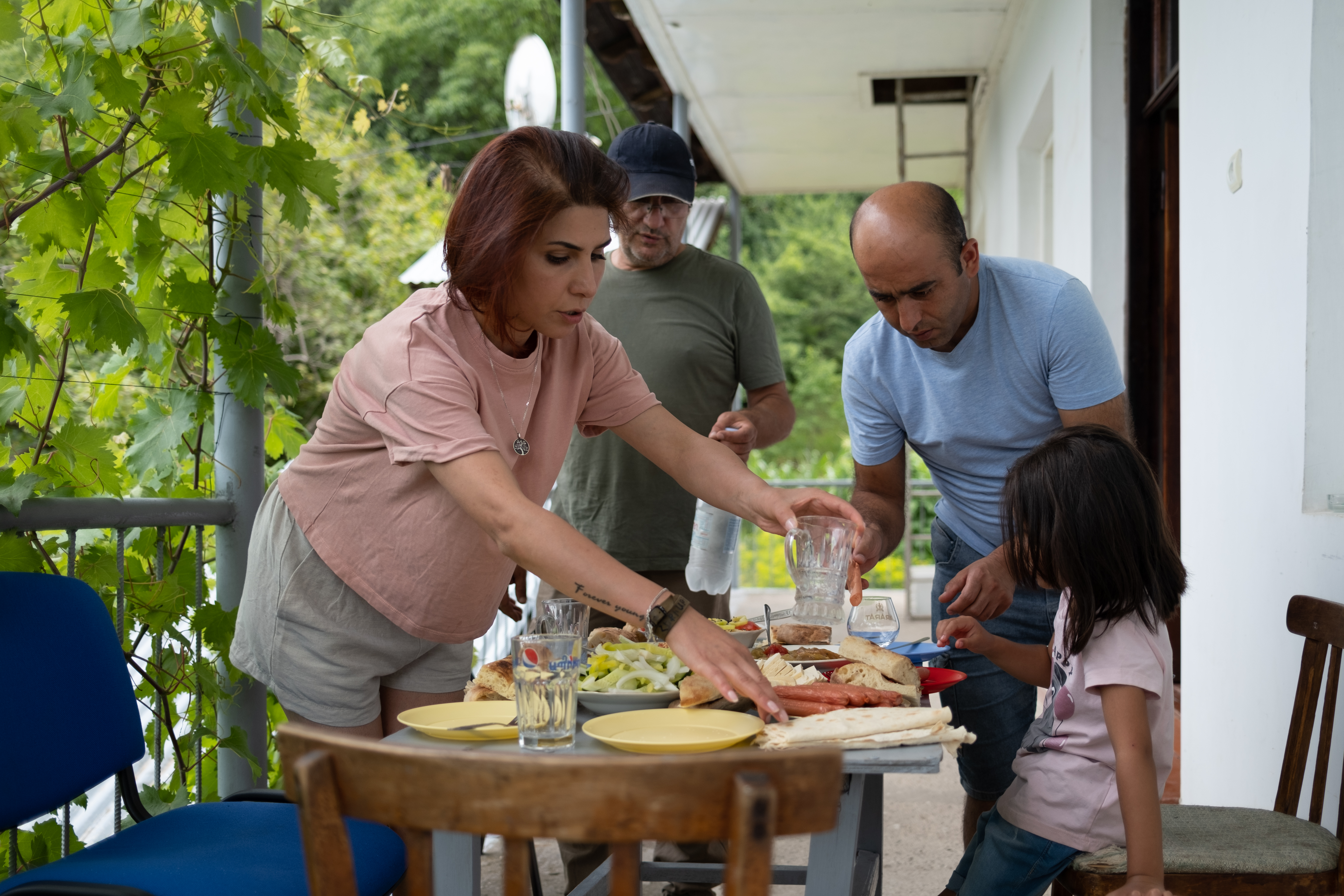 Dinner on the balcony at the end of a working day
Dinner on the balcony at the end of a working day
After the war, Hayk, Nver, Artak, Armen, Gayane, who is an actress by education and one of the “Naregatsi” group, roam in search of a new home. Their plans and goals roam with them.
 Arpi is very tired after the trip to the bees
Arpi is very tired after the trip to the bees
Their past also roams. They won't be able to repeat it anyway.
Never.




